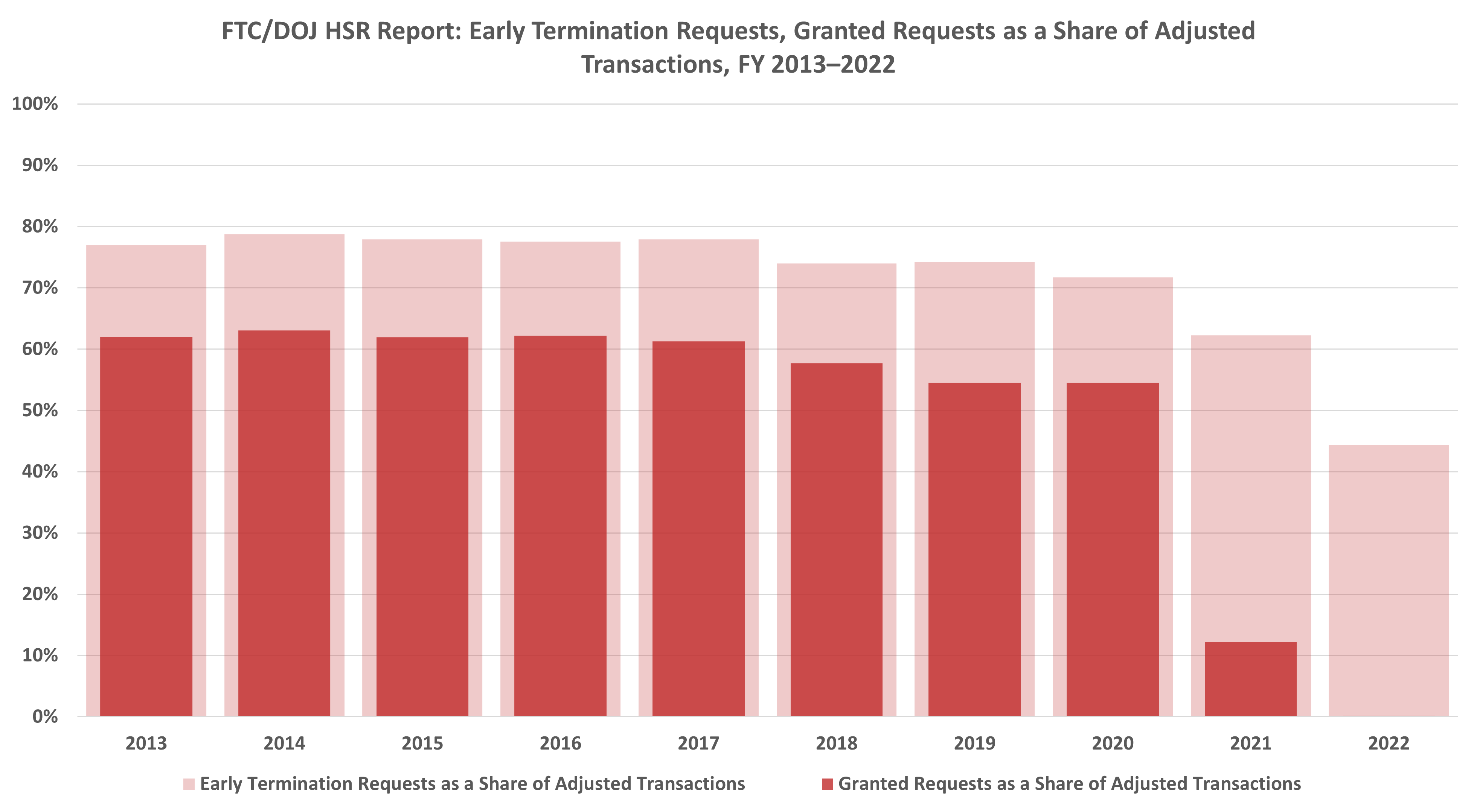Insight
January 17, 2024
Early Termination’s Termination: The First Full-Year Look from FTC and DOJ
Executive Summary
- In February 2021, the Federal Trade Commission and the Department of Justice suspended early termination, a practice which allowed mergers and acquisitions that posed no competitive concerns to close quickly.
- Over most of the past decade, between 73 percent and 81 percent of early termination requests were granted, but the latest data showed that only five out of 1,345—or 0.4 percent—requests were approved in fiscal year 2022.
- The agencies’ indefinite suspension of early termination is a needless and costly burden that delays the consummation of mergers that present no threat to competition.
Introduction
In February 2021, the Federal Trade Commission (FTC) and the Department of Justice (DOJ) announced a temporary suspension of any grants of early termination under the Hart-Scott-Rodino Act (HSR Act). The HSR Act established the premerger notification program, which requires businesses involved in mergers and acquisitions of a certain dollar value to notify the agencies before consummating the transaction. The law mandates a waiting period of 30 days before closing to afford the agencies time to determine if the deal violates antitrust laws. If the investigating agency determines that the merger or acquisition presents no threat to competition, it can terminate the HSR waiting period and allow the transaction to close early.
On December 21, 2023, the FTC and DOJ issued the Hart-Scott-Rodino Annual Report Fiscal Year 2022. The report provided data for the first full year in which the policy was in effect. As expected, the number of early termination requests granted evaporated.
The agencies have not yet provided a timeline for when, or if, early terminations will resume. Continuing the moratorium is a needless and costly burden on transactions that delays the consummation of mergers and acquisitions that pose no threat to competition.
Suspension of Early Termination
On February 4, 2021, the FTC, with support from the DOJ, announced the suspension of early terminations. Rebecca Kelly Slaughter, then acting chair of the FTC, pointed to “historically unprecedented volume of filings during a leadership transition amid a pandemic” as the rationale for the program’s suspension. Slaughter added that the agencies “will presume we need those 30 days to ensure we are doing right by competition and consumers.” That statement also noted that the “suspension will be brief.”
On March 12, 2021, the agencies issued a statement clarifying that the “temporary suspension does not apply in at least two circumstances, each involving a grant of [early termination] after the investigating agency has issued a Request for Additional Information (Second Request).” Second requests require companies to submit additional information to the agencies concerning the transaction and trigger an additional waiting period.
Coinciding with the original announcement, FTC Commissioners Noah Phillips and Christine Wilson issued a joint statement critical of the decision. They stated that “we see no rationale sufficient to justify suspending all grants of [early termination].” The two dissenters noted that “in the more than four decades of HSR Act review, the Agencies have never suspended early termination because of leadership transitions or increased merger filings,” in a direct rebuke of the reasons provided by Acting Chair Slaughter.
Commissioners Phillips and Wilson credited the diligent work of the agencies’ staff in limiting the duration of the previous suspension of early termination amid the extraordinary circumstances of the COVID-19 pandemic to two weeks. During that brief suspension in March 2021, the staff adopted a telework policy and implemented an electronic filing system. Phillips and Wilson added that the “new process has been operating smoothly for the last ten months” and that they “view the proffered justifications for suspending early termination as unpersuasive.”
The two dissenting commissioners warned that “freezing grants of [early termination] will delay the consummation of competitively innocuous transactions. Particularly during a time of economic difficulty, impeding the transfer of assets could have knock-on effects that harm employees, small businesses, and financially imperiled firms.”
HSR Report Fiscal Year 2022
The Hart-Scott-Rodino Annual Report Fiscal Year 2022 provides an insight into the enforcement actions taken by the agencies and includes several statistical tables summarizing transactions. Fiscal year 2022 is the first full year without the early termination program. The program was still in effect for four months during fiscal year 2021.
Figure 1
*Source: Appendix A: Summary of Transactions by Fiscal Year, Hart-Scott-Rodino Annual Report Fiscal Year 2022
Over the past decade, as shown in Figure 2, between 73 percent and 81 percent of early termination requests were granted by the agencies. That share dropped to 20 percent in 2021, when the early termination suspension was announced four months into the fiscal year. With the suspension in effect for the entirety of fiscal year 2022, the agencies granted just five out of 1,345 early termination requests, a rate of 0.4 percent.
Figure 2
*Source: Appendix A: Summary of Transactions by Fiscal Year, HSR Annual Report Fiscal Year 2022
Early termination requests constitute between 70 percent and 80 percent of all transactions reviewed by the agencies. Granted requests make up more than half of all transactions (Figure 3).
Figure 3
*Source: Appendix A: Summary of Transactions by Fiscal Year, HSR Annual Report Fiscal Year 2022
An unprecedented volume of HSR filings was a deciding factor in the agencies’ reasoning for suspending early termination. According to the FTC press release issued in March, “HSR transactions for the month of February hit a 10-year high in 2021.” Commissioners Phillips and Wilson questioned the merits of this rationale. They stated that “even when HSR filings more than doubled in November 2020 [400 transactions; 825 filings] compared to November 2019 [206 transactions; 413 filings], the processing of [early termination] requests continued.” Phillips and Wilson also noted that when the number of transactions reached 451 in November 2000 [fiscal year November 2001], the agency continued with its early termination program. Since early termination’s suspension, the number of transactions exceeded 451 once, in November 2021 [fiscal year November 2022] when the count reached 575.
Figure 4
*Source: Appendix B, Table 1 and Table 2, HSR Annual Report Fiscal Year 2002, 2010, 2013, and 2022; shaded area indicates observations under current early termination policy
With such a large share of transactions posing no apparent threat to competition, suspending early termination, and forcing them all to wait the mandatory 30 days, “introduces inefficiency into market operation, harming consumers and other stakeholders involved in the transactions that would have consistently received [early termination] at any point during the last 45 years,” according to the statement issued by Phillips and Wilson.
Conclusion
Over most of the past decade, between 73 percent and 81 percent of early termination requests were granted; only five out of 1,345 (0.4 percent) requests were approved in fiscal year 2022.
With more than half of all transactions reviewed by the agencies being granted early termination, indefinitely suspending the program is a needless and costly burden that delays the consummation of mergers that pose no threat to competition.














